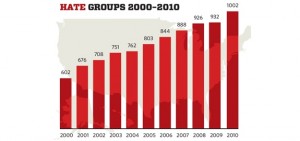Before I even begin, I should say I know this poor blog has been stagnating. It has caused me great guilt and pain, but a series of not-so-fortunate events (I’ll discuss this in another post) have somewhat blocked my writing and more importantly taken up my time. Thus, I’m back.
So here are some things to pay attention to while I get back in the swing of blogging:

1. Hate Groups are on the rise (again!) in the U.S. At the Huffington Post, Brian Levin walks us through the new Southern Poverty Law Center data for 2011. Here’s a sample:
The 2011 figures are the eleventh consecutive annual increase and the highest number since the SPLC began enumerating hate group totals in the 1980s. In 2000 there were just 602 of these groups nationally. While 2011 hate crime numbers are not yet tabulated by the Federal Bureau of Investigation (FBI), the agency counted 6,624 hate crimes in 2010 in the United States, an increase of only 26 from a 14 year low recorded the previous year. A 2010 analysis by the Institute for Homeland Security Solutions found that from 1999-2009 white supremacist and anti-government domestic extremist plots were only surpassed by those undertaken by radical Salafist and al-Qaeda followers during the decade.
The emphasis is all mine, folks. Interestingly enough, the number of Ku Klux Klan organizations declined while paramilitary and militia groups rose significantly. I want to look at the numbers myself, and I’ll blog about what this means for historians and religious studies scholars a bit later.
2. Historiann weighs in on Rush Limbaugh’s use of “slut” at a private citizen by suggesting he might be a dumba$$. I couldn’t agree more. (On a side note, if you are wondering how to define this term, Mother Jones provides a flowchart with kittens.)
3. At Time, Jessica Winter queries: “Are women people?” This provocative question is her entry point into the increasingly hostile debates over contraception, transvaginal ultrasounds, pregnancy and legislation surrounding all of this. Winter writes:
You see, like most women, I was born with the chromosome abnormality known as “XX,” a deviation of the normative “XY” pattern. Symptoms of XX, which affects slightly more than half of the American population, include breasts, ovaries, a uterus, a menstrual cycle, and the potential to bear and nurse children. Now, many would argue even today that the lack of a Y chromosome should not affect my ability to make informed choices about what health care options and lunchtime cat videos are right for me. But others have posited, with increasing volume and intensity, that XX is a disability, even a roadblock on the evolutionary highway. This debate has reached critical mass, and leaves me uncertain of my legal and moral status. Am I a person? An object? A ward of the state? A “prostitute”? (And if I’m the last of these, where do I drop off my W-2?)
4. Check out John Turner’s review of John Modern’s Secularism in Nineteenth Century America at Religion in American History. Turner writes:
Modern has written an extended critique of Common Sense philosophy and historians who have embraced it in their analysis of the history of religion in the United States (chapter one contains an extended engagement with Mark Noll). Modern “contends that human agency was an remains an open question … For those living within a secular imaginary, decision about religion were often one’s own, yet the range of available choices had been patterned and shaped by circumstance. Institutions making their invisible demands. Media generating models of particular choices. Machines enabling you to interact with your decisions and those of others. A choice being made before it presents itself as such. Unseen somethings haunting the day.” Toward the end of his book, Modern uses Foucault’s “notion of subjectivization” “to call into question a dominant paradigm of American religious historiography that continues to operate according to the same epistemological and political principles that gave rise to the discipline in the mid-nineteenth century.”